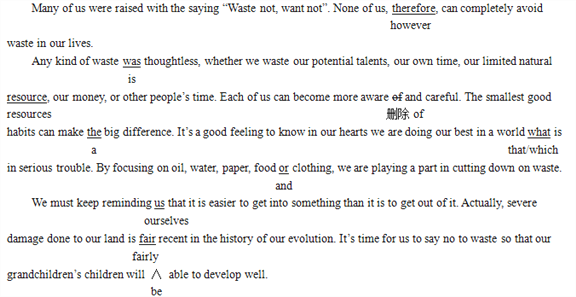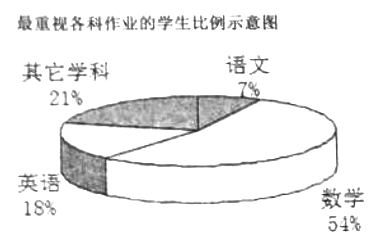题目内容
【题目】假定英语课上老师要求同桌之间交换修改作文,请你修改你同桌写的以下作文。文中共有10处语言错误,每句中最多有两处。每处错误仅涉及一个单词的增加、删除或修改。
增加:在缺词处加一个漏字符号(∧),并在其下面写出该加的词。
删除:把多余的词用斜线(\)划掉。
修改:在错的词下划一横线,并在该词下面写出修改后的词。
注意:1.每处错误及其修改均仅限一词;
2.只允许修改10处,多者(从第11处起)不计分。
Many of us were raised with the saying “Waste not, want not”. None of us, therefore, can completely avoid waste in our lives.
Any kind of waste was thoughtless, whether we waste our potential talents, our own time, our limited natural resource, our money, or other people’s time. Each of us can become more aware of and careful. The smallest good habits can make the big difference. It’s a good feeling to know in our hearts we are doing our best in a world what is in serious trouble. By focusing on oil, water, paper, food or clothing, we are playing a part in cutting down on waste.
We must keep reminding us that it is easier to get into something than it is to get out of it. Actually, severe damage done to our land is fair recent in the history of our evolution. It’s time for us to say no to waste so that our grandchildren’s children will able to develop well.
【答案】
【解析】试题分析:本文讲述的是关于生活中的浪费问题及应该采取的措施。
1.考查连接副词。句意:我们中的许多人都是这样说的:“不浪费,不需要”。 然而,我们没有人能完全避免生活中的浪费。前后句是一种转折关系,故把therefore改成however。
2.考查时态。句意:任何一种浪费都是轻率的,无论我们是在浪费我们的潜能,我们自己的时间,我们有限的自然资源,我们的金钱,还是其他人的时间。这里在讲述一种客观事实,所以句子用一般现在时态,故把was改成is。
3. 考查名词复数。句意:任何一种浪费都是轻率的,无论我们是在浪费我们的潜能,我们自己的时间,我们有限的自然资源,我们的金钱,还是其他人的时间。resource(资源),是可数名词,这里要用名词复数形式,故把resource改成resources。
4.考查形容词作表语。句意:我们每个人都能变得更加清醒和谨慎。become是连系动词,后面用形容词做表语,故把of去掉。
5.考查固定搭配。固定搭配:make a big difference产生很大的不同,有很大影响。故把the改成a。
6.考查定语从句。句意:在我们的心中,我们在一个陷入严重困境的世界里尽了最大的努力,这是一种很好的感觉。此处a world是先行词,指物,后面的定语从句缺少主语和引导词,故把what改成that/which。
7.考查并列连词。句意:通过关注石油、水、纸张、食品和服装,我们在减少浪费方面发挥了作用。此处表示并列关系,故把or改成and。
8.考查反身代词。句意:我们必须不断提醒自己,进入某件事比摆脱它更容易。这里是“提醒我们自己”,用反身代词做宾语,故把us改成ourselves。
9.考场副词。副词修饰形容词,故把fair改成fairly。
10.考查固定结构。固定搭配:be able to do sth.能做某事;will后跟动词原形,故在will后面加be。


